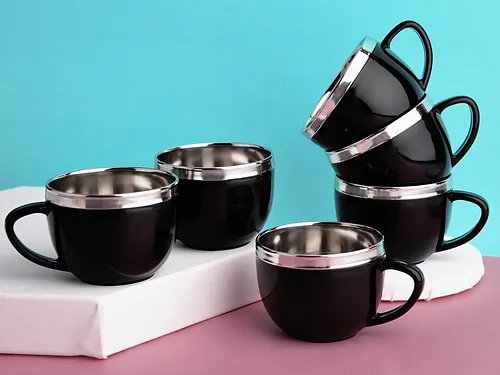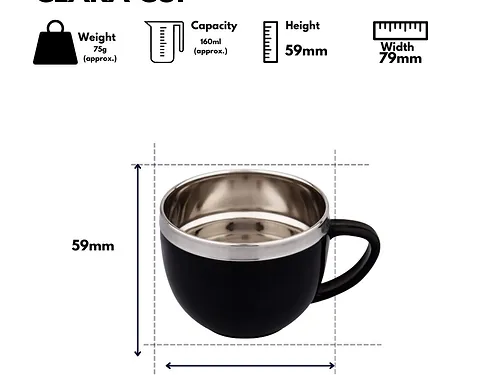Cups & Mugs, Eco Friendly Home & Lifestyle
SUGAR Homeware Clara Stainless Steel Double Wall Tea Coffee cup 150ml set of 6
₹799.0
Introducing our Sugar Homeware Clara Stainless Steel Double Wall Mug, the perfect companion for your daily tea or coffee rituals. Crafted with a durable stainless steel exterior and a plastic interior, these microwave-safe cups offer both style and practicality.
Introducing our Sugar Homeware Clara Stainless Steel Double Wall Mug, the perfect companion for your daily tea or coffee rituals. Crafted with a durable stainless steel exterior and a plastic interior, these microwave-safe cups offer both style and practicality. Designed for comfort, they feature a double wall construction for insulation, ensuring your beverages stay hot or cold longer. With a shatter-proof and chip-resistant design, these mugs are built to withstand everyday use. Elevate your tea or coffee experience with our Sugar Homeware Clara Stainless Steel Double Wall Mug today!
You must be logged in to post a review.
Q & A
Ask a question
There are no questions yet
Sustainability of the SUGAR Homeware Clara Stainless Steel Double Wall Tea Coffee Cup
- Material Durability and Reusability:
- Stainless Steel: The cup is made of stainless steel, which is known for its durability and longevity. Unlike single-use plastics or even ceramics, stainless steel can withstand repeated use without degrading in quality, reducing the need for frequent replacements.
- Reusability: The cup’s durability supports its use as a reusable item, significantly reducing waste compared to disposable cups. Each time the cup is used instead of a disposable alternative, it offsets the environmental impact associated with single-use products.
- Energy Efficiency in Production:
- Efficient Manufacturing: Modern stainless steel manufacturing processes are increasingly energy-efficient and often incorporate measures to minimize waste. Improvements in energy efficiency and waste management in the production process can lower the overall environmental impact.
- Recyclability:
- High Recyclability: Stainless steel is highly recyclable. At the end of its life, the cup can be recycled, and the material can be reused in the production of new stainless steel products. This reduces the need for virgin raw materials and decreases the overall environmental footprint.
Low Carbon Footprint of the SUGAR Homeware Clara Stainless Steel Double Wall Tea Coffee Cup
- Reduction in Single-Use Items:
- Offsetting Single-Use Items: By replacing disposable cups, the use of this stainless steel cup significantly reduces the carbon emissions associated with the production, transportation, and disposal of single-use cups.
- Efficient Thermal Properties:
- Double-Wall Insulation: The double-wall design provides excellent thermal insulation, keeping beverages hot or cold for longer periods. This can reduce the need for additional energy to reheat or cool beverages, indirectly lowering energy consumption and associated carbon emissions.
- Manufacturing with Recycled Content:
- Use of Recycled Steel: If the cup is manufactured using recycled stainless steel, the carbon footprint is further reduced. Producing stainless steel from recycled material requires significantly less energy than producing it from virgin raw materials, leading to lower greenhouse gas emissions.
- Longevity and Lifecycle Impact:
- Long Lifespan: The long lifespan of stainless steel products means that the environmental impact is spread over many years of use. This long-term use results in a lower annual carbon footprint compared to products that require frequent replacement.
Scientific Explanation and References
- Lifecycle Analysis (LCA):
- Studies on Stainless Steel Reusables: According to lifecycle analysis studies, stainless steel reusable cups typically have a lower environmental impact compared to disposable alternatives when used multiple times. An LCA conducted by Franklin Associates (2010) found that a stainless steel mug needs to be used only 24 times to break even with the environmental impacts of single-use cups .
- Carbon Emissions Reduction: The LCA further highlights that the production phase of stainless steel cups, though energy-intensive, is offset by their long-term use and recyclability, resulting in overall lower carbon emissions over the product’s life.
- Recycling and Material Efficiency:
- Recyclability: A study by the International Stainless Steel Forum (ISSF) emphasizes that stainless steel’s recyclability significantly contributes to its sustainability profile, with an estimated global recycling rate of over 80% .
- Energy Use in Recycling: Recycling stainless steel requires substantially less energy than producing new steel from iron ore, resulting in significant reductions in greenhouse gas emissions. The Steel Recycling Institute (2019) reports that using recycled steel can save up to 74% of the energy required for primary steel production .
References
No more offers for this product!
General Inquiries
There are no inquiries yet.



















Reviews
There are no reviews yet.